Tamilnadu State Board New Syllabus Samacheer Kalvi 5th English Guide Pdf Term 3 Poem 2 Why Questions Text Book Back Questions and Answers, Summary, Notes.
Tamilnadu Samacheer Kalvi 5th English Solutions Term 3 Poem 2 The Dreamer
5th English Guide The Dreamer Text Book Back Questions and Answers
A. Answer the following questions:
Question 1.
How are we divided in real world?
Answer:
In the real world, we are divided by caste, religion, race, and wealth.
Question 2.
Does the poet want diversity? why?
Answer:
No, the poet does not want diversity. Due to diversity, wars occur and people have to die.
Question 3.
Do you like this kind of world?
Answer:
Yes, I like this kind of world, that is without any diversity, to live peacefully.
![]()
B. Imagine your world and write its qualities in the cloud:
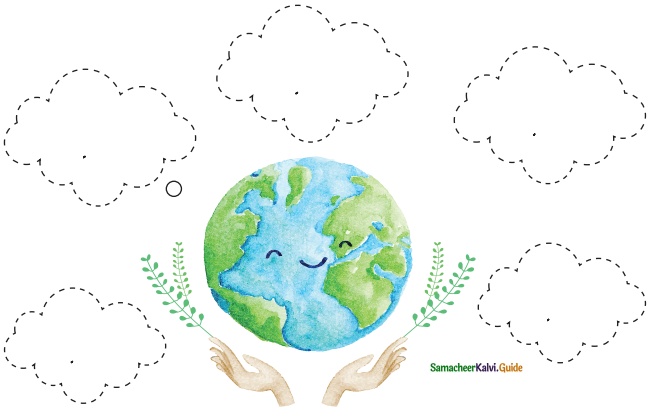
Answer:
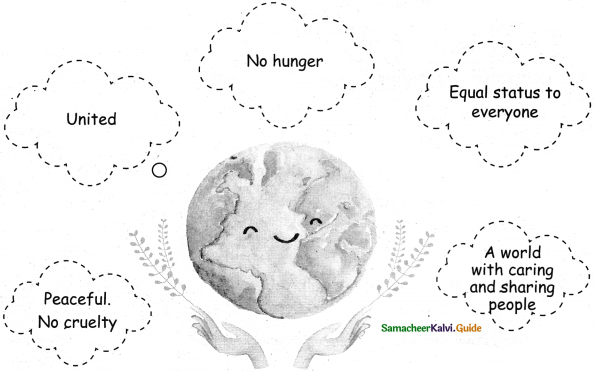
![]()
Let Us Know:
Pronouns:
Pronouns are used in the place of a noun. When we have to repeat a noun, we should use a pronoun instead of a noun.
Types of Pronouns:
1. Subjective Pronoun:
Acts as the subject of a sentence. It performs the action of the verb.
Subjective Pronouns:
I, We, You, They, He, She, It
Example :
- I went to the post office yesterday.
- She talked to her friend on the cell phone.
- You walked 3 miles yesterday.
- They live near my house.
- We work together as a team.
- It is a beautiful scene on the wall.
- He likes tomato soup.
2. Objective Pronoun:
Replaces a noun and functions as an object in the sentence.
Objective Pronouns:
Me, Us, You, Him, Her, It, Them
Example :
- she walked out to meet them.
- They said that it was good to see her.
- She told me all about it:
- Prem called Sheela and me for lunch.
- Grandma came to the hospital with us.
- The teacher gave him an answer.
- I bought these gifts for you.
![]()
3. Possessive Pronoun:
Takes the place of a noun phrase to show ownership.
Possessive Pronouns:
My, Our, Your, Their, His Her, Its
Example :
- Your lunch is ready.
- Go to her birthday party.
- The dog is licking its bone.
- This is my sister’s house.
- This is his computer.
- Their dog barks all time.
- You can use our car.
4. Reflexive Pronoun:
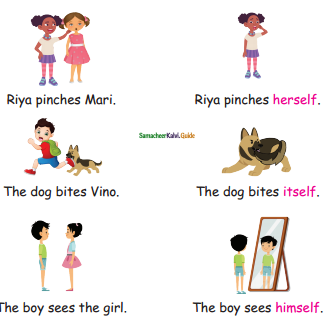
In the above examples, the coloured words represent Reflexive Pronouns.
A Reflexive Pronoun is used when something does something to itself.
Reflexive Pronouns:
Myself, Ourselves, Yourself, Yourselves, Themselves, Himself, Herself, Itself
Example:
- She took herself to the hospital.
- I whistled to myself to pass time.
- We thought to ourselves we have made the best decision.
- Pull yourselves together, the warden is coming.
- The students decorated their classrooms by themselves.
- Balu introduced himself to his workers.
- We can make a good team ourselves.
- Don’t blame yourself for the mistake.
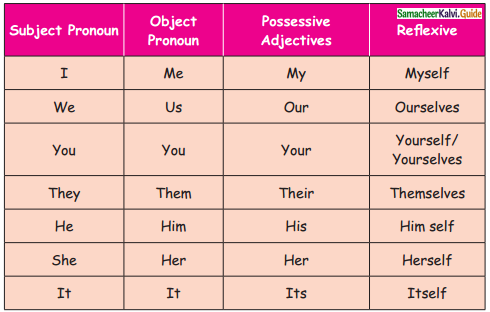
![]()
Text Book Excercise:
Try this:
Fill up with the correct Pronouns:
Question 1.
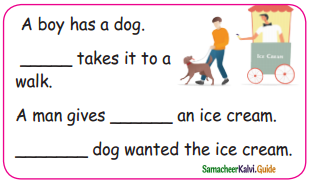
Answer:
A boy has a dog. He takes it for a walk. A man gives it ice cream. His dog wanted the ice cream.
Question 2.
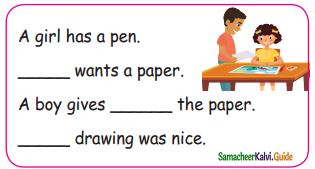
Answer:
A girl has a pen. She wants paper. A boy gives her the paper. Their drawing was nice.
Question 3.
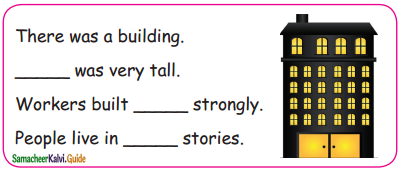
Answer:
There was a building. It was very tall. Workers built themselves strongly. People live in their stories.
![]()
A. Choose the correct reflexive pronoun:
Question 1.
Each morning, I brush my teeth and stare at ______ in the mirror.
(a) himself
(b) herself
(c) myself
(d) itself
Answer:
(c) myself
Question 2.
Dad and I painted the trailer ______.
(a) myself
(b) himself
(c) itself
(d) ourselves
Answer:
(d) ourselves
Question 3.
The children made holiday decorations by ______.
(a) itself
(b) ourselves
(c)themselves
(d) their selves
Answer:
(c) themselves
Question 4.
Paul copies his friend’s homework instead of doing it ______.
(a) itself
(b) himself
(c) myself
(d) yourself
Answer:
(b) himself
Question 5.
Please make at home while you wait for ______.
(a) themselves
(b) himself
(c) yourselves
(d) herself
Answer:
(c) yourselves
![]()
B. Complete the sentence with the correct reflexive pronoun:
(Myself, yourself, himself, herself, itself, ourselves, themselves)
Question 1.
I like ______.
Answer:
I like myself.
Question 2.
She put ______ into trouble.
Answer:
She put herself into trouble.
Question 3.
Teachers teach ______ a new lesson every day.
Answer:
Teachers teach themselves a new lesson every day.
Question 4.
The machine will destroy ______ once its task is done.
Answer:
The machine will destroy itself once its task is done.
Question 5.
You made it harder for ______.
Answer:
You made it harder for yourself.
![]()
Let us listen:
C. Listen to the audio and tick where the following statements are true or false:
Question 1.
It is the first day at School.
Answer:
True
Question 2.
All the children are coming only by bus.
Answer:
False
Question 3.
There are many children outside.
Answer:
False
Question 4.
She hold her mom’s hand very tight.
Answer:
False
Question 5.
The teacher smiles at Rani.
Answer:
True
![]()
Let us speak:
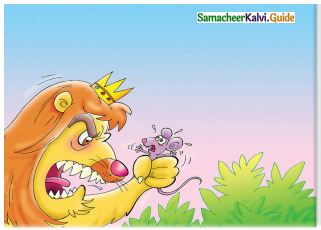
Lion: “I am going to eat you”.
Mouse: “Oh! lion! Please leave me. I can save you in danger”.
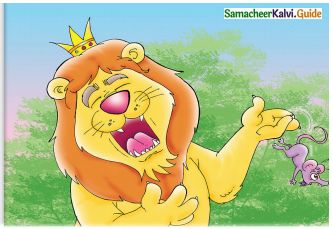
Lion: “How will you save me? Now run away before I eat you”
Mouse: “Thank you, Mr. Lion!”
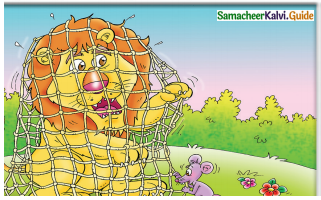
Lion: “Help, Help! I have caught in a net”.
Mouse: “Oh king, I am happy I could help you”.
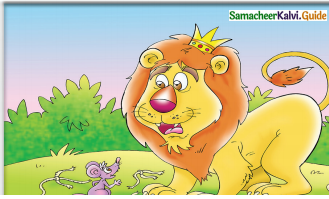
Lion: “Thank you rat for saving me”.
Rat: “Let us help each other and live happily”.
![]()
5th English Guide The Dreamer Additional Questions and Answers
I. Look at the pictures. Make simple sentences and tell the story:
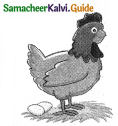
A hen laid her eggs on alternate days.
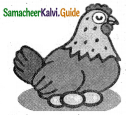
She sat patiently on her eggs to hatch.

The eggs break and the chicks peep out.
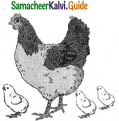
The hen and its chicks went to the fields happily.
![]()
II. Answer the following:
Question 1.
What does the poet think about diversity?
Answer:
The poet thinks that diversity will bring hatred, fight, and killing among people of different castes and religions.
Question 2.
How can we remove inequality in this world?
Answer:
We can remove inequality by sharing our belongings with others.
Question 3.
What will be the result of inequality?
Answer:
Inequality among people will lead to greed, hunger, poverty, and hatred.
Question 4.
Does only the poet dreams? What does he dream?
Answer:
No, not only the poet but the others also dream. He dreams, of a united world without any diversity or inequality.
![]()
The Dreamer Summary in English and Tamil
Imagine!
There are no diversity,
It isn’t hard to do,
Nothing to kill or die for.
கற்பனை செய்து பாருங்கள்…
(மக்களிடம் இனம், மொழி போன்ற
வேற்றுமைகளே இல்லாத ஒரு நிலையை)
இதைச் செய்வது கடினமல்ல.
இது யாரையும் கொல்வதற்கோ, யாரும் சாவதற்கோ செய்யப்படுவதல்ல
Am I a dreamer?
I hope not the only one,
Will you join me?
To make the world as one.
நான் ஒரு கனவு காண்பவனா?
நான் ஒருவன் மட்டுமே கனவு காண்பவன் என்பதில் எனக்கு நம்பிக்கை இல்லை.
நீங்கள் என்னுடன் சேருவீர்களா?
உலகை ஒற்றுமையாக (ஒன்றுபட்டதாக) மாற்ற.
![]()
Imagine!
All that belongs to you isshared,
I wonder if you can,
No need for greed or hunger.
கற்பனை செய்து பாருங்கள்
உங்களுக்குச் சொந்தமானவை எல்லாமே பகிர்ந்து கொள்ளப்படுகின்றன என்ற நிலையை.
இதை உங்களால் செய்ய முடியுமா என்று நான் கேட்கிறேன்.
இதில் பேராசைப்படுதல் அல்லது பட்டினி கிடத்தல் என்பதற்கான தேவையே இருக்காது
Am I a dreamer?
I hope not the only one,
Will you join me?
To make the world as one.
நான் கனவு காண்பவனா?
நான் ஒருவன் மட்டுமே கனவுகாண்பவன் என்பதில் எனக்கு நம்பிக்கை இல்லை.
நீங்கள் என்னுடன் சேருவீர்களா?
உலகை ஒற்றுமையாக (ஒன்றுபட்டதாக) மாற்ற.
![]()
The Dreamer Glossary:
Belong – To be a part (சொந்தமானது)
Greed – Excessive desire (பேராசை)
Hunger – Desire for food (பட்டினி)
Hope – Confident (நம்பிக்கை)
Imagine – Think (கற்பனை செய்தல்/நினைத்தல்)
Share – Distribute (பகிர்ந்து கொள்வது)
Wonder – Surprise (ஆச்சர்யம் (Here, inquire, question/கேட்டல்)